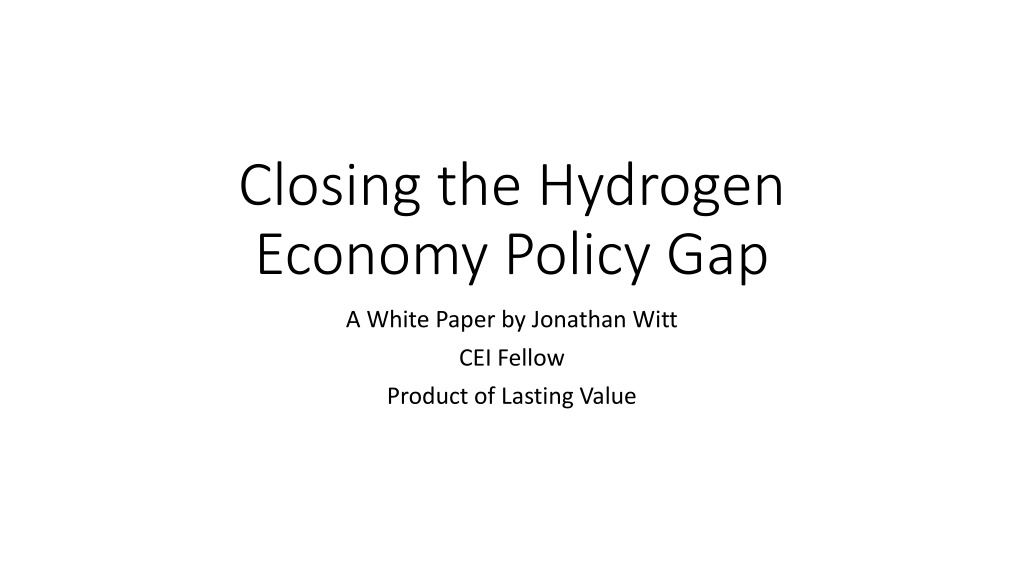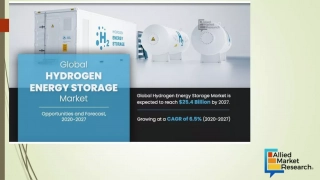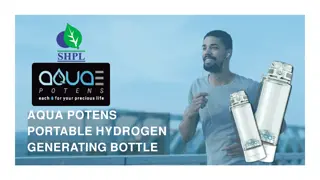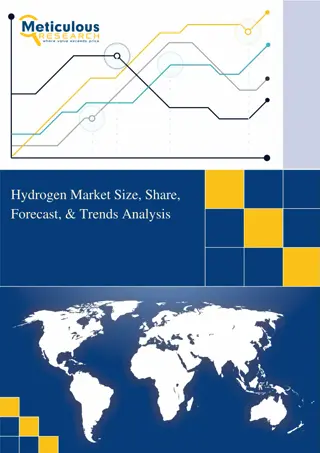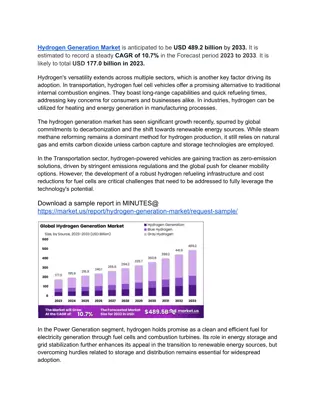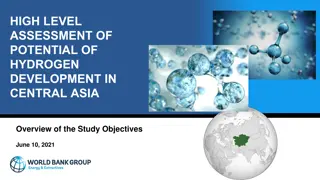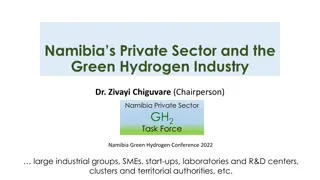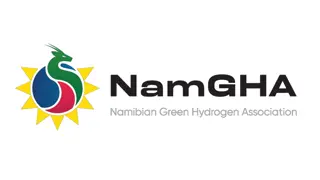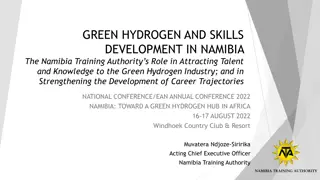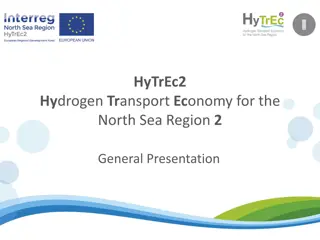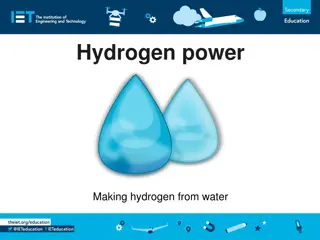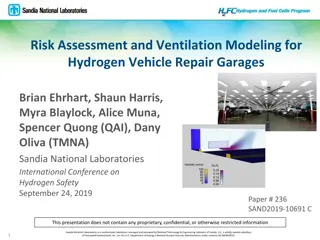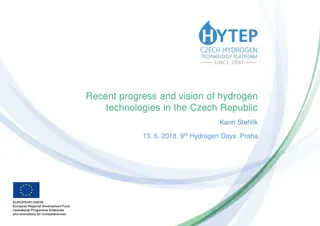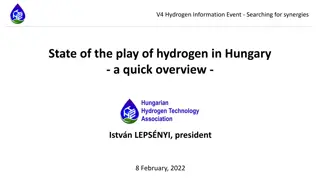Overview of Hydrogen Economy Policies in California, British Columbia, and Oregon
This document outlines the current hydrogen economy policies in California, British Columbia, and Oregon. California is leading in commitment to hydrogen fueling stations, aiming for ZEV dominance by 2050. British Columbia is investing in fuel cell research and infrastructure development. Oregon targets hydrogen price competitiveness and alternative fuel loans, with an inter-state ZEV deployment support agreement.
Download Presentation

Please find below an Image/Link to download the presentation.
The content on the website is provided AS IS for your information and personal use only. It may not be sold, licensed, or shared on other websites without obtaining consent from the author. Download presentation by click this link. If you encounter any issues during the download, it is possible that the publisher has removed the file from their server.
E N D
Presentation Transcript
Closing the Hydrogen Economy Policy Gap A White Paper by Jonathan Witt CEI Fellow Product of Lasting Value
Map of Government Policies and Initiatives Leading developer of fuel cells technology. Invests in fueling stations and R&D. One public hydrogen fueling stations with another planned to be open soon in 2018. Has the Hydrogen Fueling Infrastructure Program. No laws solely addressing a hydrogen economy. Two laws that mention hydrogen as an alternative. Two laws promoting alternative fuels to gasoline. Zero Emission Vehicle (ZEV) Deployment Support Laws. MOU with 8 other states on ZEV deployment and infrastructure building, including a mandate to cooperate with hydrogen providers to encourage market growth. Over 32 laws, regulations, and agency initiatives related to a hydrogen economy and fueling stations. By 2050, 87% of vehicles on road must be ZEV. 62 funded stations, planned to all be open to the public by 2020. https://www.afdc.energy.gov/fuels/laws/HY
California Hydrogen Fueling Station Map: A Role Model for Hydrogen Policy California has committed up to $20 million a year up to 2024 for building up to 100 hydrogen fueling station. By 2050, 86% of vehicles will be ZEV. Currently 62 stations. Report on the state of fuel cell electric vehicles and fueling stations due every June and recommendations to the California Energy Commission made. http://californiaarb.maps.arcgis.com/apps/webappviewer/index.html?id=99be905d3127405e8 1851fd60b19cda2 https://www.afdc.energy.gov/fuels/laws/HY
British Columbia Investing in a hydrogen fueling station network. Using Powertech Labs fueling stations in Surrey, BC. Claims to be world leader in funding fuel cell research and is considered a major breakthrough market for fuel cell car manufacturers. Will build up infrastructure in the Lower Mainland first. The Hydrogen Fueling Infrastructure Program is managed by the Canadian Hydrogen & Fuel Cell Association. Second station to be complete 2018. https://www2.gov.bc.ca/gov/content/industry/electricity-alternative-energy/transportation-energies/clean-transportation-policies-programs/clean-energy-vehicle- program/hydrogen-fuelling
Has set a target competitiveness of < $4/gge Oregon gge 1 kg H2 = 1 gallon gasoline energy equivalent Plans to make hydrogen into ammonia to burn later to make water, nitrogen, and energy. Offers Alternative Fuel Loans and Clean School Bus Grants. State rebate program for ZEV and PHEV MOU with CA, CT, MD, MA, NJ, NY, RI, VT to support deployment of ZEVs through involvement in the ZEV Program Implenetation Task Force. Adequate infrastructure in these states by 2025. Assess and develop potential deployment strategies and infrastructure requirements for the commercialization of hydrogen fuel cell vehicles. And a few more clean air, alternative vehicles, and fuel standards laws. https://www.afdc.energy.gov/fuels/laws/HY http://www.oregon.gov/energy/energy-oregon/Pages/Hydrogen.aspx
Washington Alternative Fuel Commercial Vehicle Tax Credit The alternatives are natural gas, propane, hydrogen, dimethyl ether, or electricity Alternative Fuel Vehicle (AFV) Tax Exemption Exempts AFVs that use the fuels above from a tax of sales and use. Volkswagen Settlement Allocation 15% of WA Volkswagen Mitigation Trust Fund to be used for light duty ZEV charging infrastructure. Low Carbon Fuel and Fuel-Efficient Vehicle Acquisition Requirement WA agencies must consider buying AFVs if life time cost competitive. 36 mpg target. https://www.afdc.energy.gov/fuels/laws/HY
Nikola Motors Primed to Expand Hydrogen https://nikolamotor.com/stations
Recommendations WA needs to step up its game. All the other west coast states and provinces have defined hydrogen infrastructure programs whereas WA has none. WA has no laws solely dedicated to hydrogen economy. WA should consider utilizing the models from these other states and join the MOU that Oregon and California are a part of. WA has vast resources for hydrogen electrolysis. This is an opportunity to attract businesses, jobs, and be at the forefront of a new industry.
